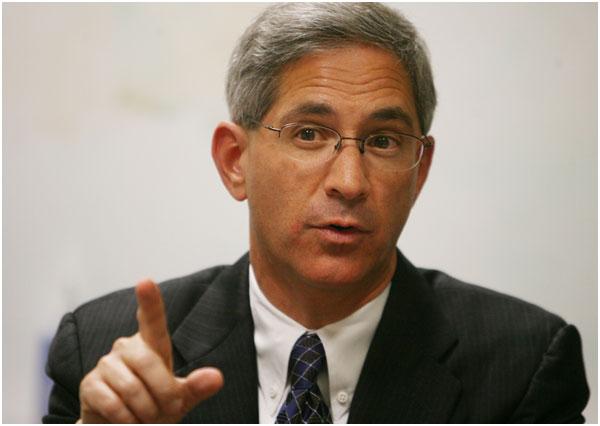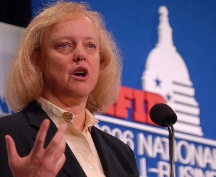With this shameful end-run around Proposition 13 being perpetrated by Capitol Democrats, one of our readers, Andy Nevis, asked if those who aspire to be our next Republican Governor had publicly commented on the situation. In response to that, I sent an e-mail to both the Steve Poizner for Governor campaign and to representatives of Meg Whitman, who has not formally announced her candidacy, but is in the final stages of preparing to do so.
Specifically, sent the following:
Below are the responses that I received, one from Insurance Commissioner Poizner, and the other from a representative of Meg Whitman. Poizner provided a thoughtful and specific statement. Whitman basically declined to give us her thoughts on the matter, her declined to comment, saying that she is not yet “formally” a candidate.
As I repeatedly share with readers, as an officer of the California Republican Party, I do not endorse in primaries. But that doesn’t mean I don’t have opinions – especially in this particular situation. Poizner’s response demonstrated that he is watching the process in the Capitol intently, has put considerable thought in the matter, and is comfortable enough in his convictions to get a comprehensive statement to me in a short period of time.
I was, frankly, surprised and disappointed that Mrs. Whitman decided not to share her views on this significant turn of events in the State Capitol. I guess I don’t understand the notion that if someone is putting together a team for a run for Governor – hiring consultants, arranging a network for financial support, and seeking endorsements, but hasn’t formally announced their candidacy, why they cannot opine on major issues such as this one.
I certainly hope that going forward, especially after she announces her campaign officially, that Mrs. Whitman will be very outspoken on the myriad of issues that are facing state government – I think that is a reasonable expectation, don’t you? Maybe at that time, she can give our readers her thoughts on whether what the Democrats did today was good or bad public policy.
THE STATEMENTS RECEIVED:
 FROM STEVE POIZNER
FROM STEVE POIZNERSame game, new players.
It should not come as a shock to anyone that the Democrats in the legislature are again proposing tax increases. It wasn¹t that long ago, in the face of a multi-billion dollar surplus, then Assembly Speaker Antonio Villaraigosa proposed a sales tax increase and then Assemblywoman Carol Migden proposed taxing the Internet. Surplus or deficit, their desire to spend money is insatiable.
But what makes the current Democratic proposal even more insidious is that, under the guise of so-called "revenue neutrality,’ the legislature is poised to pass billions of dollars in additional taxes by a majority vote.
The Democratic proposal is a slap in the face to the notion of civil and respectful debate, two-party rule and the voters of California. If the Democrats think they can suspend the constitutional requirements the voters placed on the Legislature in Proposition 13, what other laws will they ignore?
The two-thirds vote requirement for new taxes was enacted by the voters thirty years ago when they overwhelmingly approved Proposition 13. The voter’s intent was clear: raising taxes should be difficult and should require more than a bare majority vote. The desire to raise taxes is too often a knee-jerk reaction to make a problem go away rather than actually solve it.
The reason the legislative democrats are frustrated is that they are laser focused on preserving the government’s status quo rather than doing the hard work that this financial crisis requires: prioritizing the tens of thousands of government programs and doing what every California family does every year cut back when there isn¹t enough money. Theirs is an act of desperation, not of statesmanship.
This crisis gives us the opportunity to make positive changes for the future. The economic situation facing California is unparalleled and it will not be getting better soon. It is not easy for us, or for anyone, to spend less money, but at least for the present, this is the wisest course.
What we cut today, we may be able to restore in a better economy. But if we can¹t make serious and substantial reductions now, we never will. And this is not the kind of thinking that will enhance our ability to compete in a rapidly changing, 21st Century economy.
California is not a one-party state. It is not even a two-party state, with 20% of registered voters having rejected both parties. Unilateral power plays like this only enhance the revulsion voters have that politicians are losing touch with reality.
Republicans in the legislature should be commended for standing up to this extra-constitutional power play.
PS: It is this kind of Democrat legislative arrogance that led me to lead the charge against Proposition 93 (Term Limit Extension).
 FROM MITCH ZAK, ON BEHALF OF MEG WHITMAN
FROM MITCH ZAK, ON BEHALF OF MEG WHITMAN
Thanks for invitation Jon,
As you can imagine, we’re getting many of these requests. However, as we’re not an announced candidate, we respectfully decline.


December 18th, 2008 at 12:00 am
Well Meg, I respectfully think your “no comment” is more like a tacit approval of the end run the Dems tried today on our state Constitution.
December 19th, 2008 at 12:00 am
That just made my decision.
December 19th, 2008 at 12:00 am
What about Tom Campbell? He is also a leading 2010 gubenetorial candidate.
December 19th, 2008 at 12:00 am
Candidate or not, Meg Whitman should take a stand.
Bottom line is this: Proposition 13, HANDS OFF! It is the best protection for all California property owners can have from zealot Democrats that wants to raise taxes.
December 19th, 2008 at 12:00 am
Since when do you need to be an “announced candidate” to have an opinion?
December 19th, 2008 at 12:00 am
Steve Poizner is absolutely right: “This crisis gives us the opportunity to make positive changes for the future.” This might be the best opportunity in a generation or more for Californians to cut government back to its proper size.
Tax increases, whether unconstitutional or not, will not solve this problem. They will only encourage the Democrats to continue to increase spending, without regard to the cost-effectiveness of current government programs.